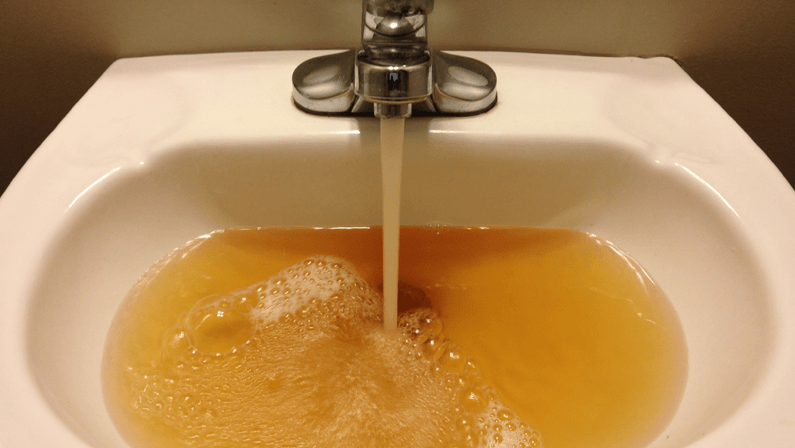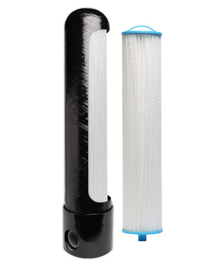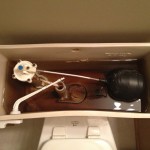I Have City Water, Why Do I Have Rust Stains?

Rust stains in city water? How is that possible?
Most people think rust stains are only a problem with private wells.
That belief changes quickly when you fill your child’s bath with discolored water. So do rust stains on your driveway, and spotted or yellow looking laundry.
Let’s take a look at why these stains pop up, and what you can do prevent them!
Why Does City Water Get Rusty?
Most communities in the Twin Cities draw water from deep aquifers. The raw water is usually very high in minerals like Iron, Manganese, and maybe even Arsenic.
City water treatment plants use a combination of chemical oxidizers and sand filters. Iron and Manganese are reduced below staining levels – but not completely removed. Then the water travels through 100’s – 1000’s of miles of water mains that run through the city.
Over time, the tiny levels of Iron and Manganese build up in the city water lines. Every once in a while, that “build up” is knocked loose into the water supply. Here’s why:
Hydrant Flushing
When a fire hydrant is opened up, water comes blasting out at 100+ gallons per minute. This is done on purpose to break the deposits loose and flush them into the street. Some of those deposits can end up in your home if you accidentally use water during flushing.
Water Main Breaks
Cities like Minneapolis and St Paul average 1 water main break a week or more. It happens fairly often in suburbs too. When a line breaks open, shockwaves blast through the water system and knock rusty minerals into the water supply. Dirt, debris, and even bacteria can also enter the water line.
New Construction
New neighborhoods can temporarily change the water quality in your city. Heavy machinery can shake deposits loose inside water pipes. Water turbulence from each new water connection can also stir things up and send rusty water your way.
Heavy Irrigation
On hot, dry summer days it seems like everyone in town waters their lawn. The flow through water mains is so fast it scours the pipe clean – just like hydrant flushing.
So How Can You Fight Rust Stains?
Your Water Softener won’t help with rust stains. Here’s why:
Hard Water and dissolved Iron will stick to Water Softener resin beads, and the water will come out nice and clear.
But Chlorine in city water oxidizes Iron. Once oxidized, Iron can’t be removed by a Water Softener. Oxidized Iron cannot stick to softener resin.
So what’s the answer: a Filter!
A Whole House Filter with a rating of 5 microns or smaller will do a great job of stopping rusty city water.
There are 2 standards that a Whole House Filter needs to pass:
- The Filter must have enough surface area to handle the flow rate your family needs. You may need 7-8 gallons per minute (gpm) during peak use (learn how to find your Flow Rate)
- The Filter must have enough loading capacity to handle the volume of water your family uses.
In the past, people were limited to small 2.5” x 10” or even 4” x 20” filters. These small filters would load up quickly and people would lose water pressure. Filters had to be changed every 1-6 months.
 Our Cartridge Filter Tank is a MUCH better solution. Here’s why:
Our Cartridge Filter Tank is a MUCH better solution. Here’s why:
- The HUGE 6” x 35” Filter Cartridges have far more loading capacity than smaller filters. In most cases, our Filters only have to be changed every 2-3 years.
- The unique fiber surface of our pleated Green Series Filters has over 42,000 square feet of surface area. Compare that to roughly 100 square feet on other filters. More surface area = more loading capactiy + higher flow rates
- Our Filters can deliver 30gpm+ with only a minor 1-3psi loss in pressure. Compare that to the smaller filters that lose 15spi at 4gpm!
Our Cartridge Tank Filter System is the simplest, most-effective Whole House Filter System we have ever used to prevent rust stains from city water!
About Premier Water
Premier Water is a residential and commercial water treatment company based in Chanhassen, MN. We’ve been working hard since 1978 to become the most trusted Water Treatment experts in the Twin Cities. If you have a water problem, question, or need a quote, please call us at (952) 479-4553. We’re here to help!

